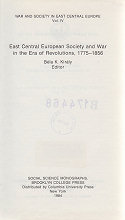
East Central European society and war in the era of revolutions, 1775–1856 (előszó)
The present volume is the fourth in a series that, when completed, will constitute a comprehensive survey of the many aspects of war and society in East Central Europe. The chapters of this and forthcoming volumes have been selected from papers presented at a series of international, interdisciplinary scholarly conferences conducted by the Brooklyn College Studies on Society in Change in cooperation with other institutions of higher learning.
These volumes deal with the peoples whose homelands lie between the Germans to the west, the Russians to the east and north, and the Mediterranean and Adriatic seas to the south. They constitute a particular civilization, one that is at once an integral part of Europe, yet substantially different from the West. The area is characterized by rich variety in language, religion, and government, and, not surprisingly, a similar variety can also be observed in concepts of national defense, in the nature of the armed forces, and in the ways of waging war. The study of this complex subject demands a multidisciplinary approach and, accordingly, our contributors represent several academic disciplines. They have been drawn from universities and other scholarly institutions in the United States, Canada, and Western Europe, as well as in the East Central European socialist countries.
Our comparative investigation of military behavior and organization attempts to ascertain what is peculiar to particular nations and ethnic groups, what has been socially and culturally determined, and what has resulted from the exigencies of the moment. We try to define different patterns of military behavior, including the decision-making processes, the attitudes and actions of diverse social classes, and the degree of restraint (or lack thereof) typically shown in war. We endeavor to present considerable material that can help us to understand how the process of social, economic, political, and technological change, as well as the changes in the sciences and in international relations, influenced the development of doctrines of national defense and altered actual practice in such areas as military organization, command, strategy, and tactics. We also present data on the social origins and mobility of the officer corps and the rank and file, on the differences between the officer corps of the various services, and above all, on civil-military relations and the origins of the East Central European brand of militarism. The studies will, we hope, deepen our understanding of the societies, governments, and politics of East Central Europe.
Our methodology takes into account the changes in the study of war and national defense systems which have occurred in the last three decades. During that period, the study of war and national defense systems has moved away from a narrow focus on battles, campaigns, and leaders and now views a country's military history in the context of the evolution of the entire society. In fact, historians, political scientists, sociologists, philosophers, and other students of war and national defense have come to recognize the interdependence of changes in society and changes in warfare; they accept the proposition that military institutions closely reflect the character of the society of which they are a part. Recognition of this fact is a keystone of our approach to the subject.
Works in Western languages now provide adequate coverage of the diplomatic, political, intellectual, social, and economic histories of the peoples of East Central Europe. In contrast, few substantial studies of their national defense systems have yet appeared in Western languages. Similarly, though some comprehensive accounts of the nonmilitary aspects of the history of the entire region have been published in the West, there is as yet no comprehensive account of the area's national defense systems in any Western language. Nor is there any study of the mutual effects of the concepts and practices of national defense in East Central Europe. Thus, this comprehensive study of war and society in East Central Europe is a pioneering work.
This volume concentrates upon the so-called era of revolutions, 1775–1856. For all these nations these were the crucial years of nation-building, a process in which their armed forces played an important role. Even in the case of the Poles, whose state was not to be reestablished until the twentieth century, insurrectionary armies played an important role in consolidating national consciousness. The theme designated in the title of this book is also explored in two other volumes in this series: War and Society in East Central Europe, vol. 7, Wayne S. Vucinich, ed., The First Serbian Uprising, 1804–1813; and vol. 16, Béla K. Király, Emanuel Halicz, and János Decsy, eds., East Central European Classics of Military Thought: Rákóczi and Kościuszko. These three volumes should be viewed as a comprehensive whole.
The editor, of course, takes full responsibility for ensuring the comprehensiveness, cohesion, internal balance, and scholarly quality of the series he has launched. I cheerfully accept this responsibility and intend this work to be neither a justification nor a condemnation of the policies, attitudes, and activities of any of the nations involved. At the same time, because the contributors represent so many different disciplines, languages, interpretations, and schools of thought, our policy in this, as in past and future volumes, is to present their contributions without modification. In this sense, the volume is a sampling of the schools of thought and the standards of scholarship in the many countries to which our contributors belong.
B. K. K.